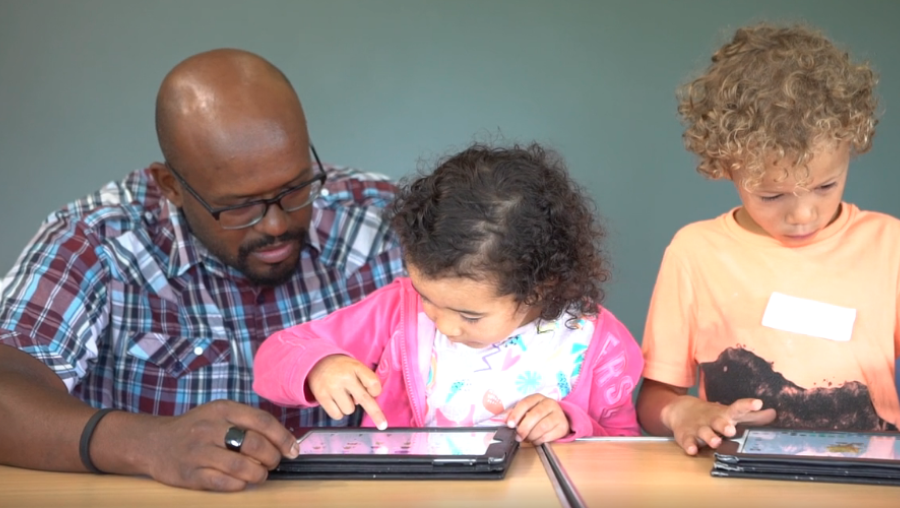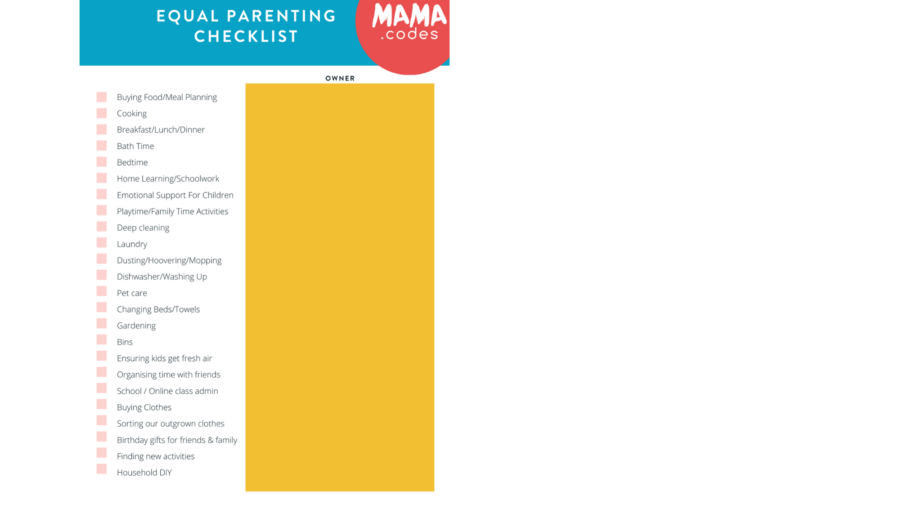Lockdown lessons: 8 tips to achieve equal parenting
This Fathers’ Day, MAMA.codes would like to celebrate the many Dads who have done their part during lockdown, and share our team and community’s tips on achieving a more equal parenting household.
Posted on Jun 20, 2020

One of the big talking points during quarantine has been the potential impact on working mothers’ careers from shouldering the majority of childcare, housework and home learning while the whole family is at home.
Newspaper headlines have warned we risk returning to a “1950s style of living” and researchers at the University of Sussex found 72% of mothers describing themselves as the “default” parent during lockdown.
When discussing this in our team, however, we didn’t recognise this experience, and neither did a number of families we spoke to in our community. We asked them to share their tips on practical ways to share the load and create a more equal parenting household.
1. Create A Plan Together
“Talking about what is needed is super important,” advises Rushani Mahendran, Operations Manager at MAMA.codes, who is homeschooling 2 children five and under, while she and her husband work full time from home with no childcare. Previously, they had relied on grandparents for support outside of school and nursery.
“It can be easy to think that what’s needed is obvious to your partner, but sometimes it requires making things super clear or asking for help — and then you’ll be surprised at how many partners just don’t realise how long the To Do list is and are more than willing to do their share.”
“When we first had kids I did feel that I was carrying most of the mental load for the family whilst also trying to maintain my career, but after an honest chat with my husband he realised just how much I had been juggling. He’d thought I wanted to keep control of things and that I would do a better job than him, but it couldn’t have been further from the truth.
“He shared the end of my maternity leave with both children so I could go back to work knowing they were in the best hands, which really helped him develop a great bond with them, but also gave him a real understanding of just how much is involved in organising things at home — so when it came to lockdown, we sat down and discussed what we both needed from each other and agreed how we would raise anything that wasn’t working in a constructive way. He’s been the person who’s kept everything running smoothly whilst also working full time and I couldn’t be more grateful.”
“The headlines don’t resonate with me at all,” says Colleen Wong, Founder and CEO of parent tech brand Tech Sixty-Four and inventor of the My Gator Watch kids’ phone, watch and tracker.
“I have a partner who cooks most meals, watches the kids when I have calls — he has a full-job too but gives the kids (5 and 6) tasks in his office so I am not bothered. He takes over at 5pm so I can go for my 1 hour run and does the entire bedtime routine including bath and books.
“This wasn’t always the case when we first had kids. I just tell him straight up when I am over-worked or feel the workload is unfair or I just want to relax. What makes me happy is that he listens.“

“You know you’re in a healthy, functional partnership because your load is shared, not added to. And they bring out your best side,” observes Hayley Brockie Dunlop, a copywriter and mum to two young children of 1 and 5.
“I basically see it a bit like a jobshare — in other words, we’re a single parenting entity who hand over the baton and can see what needs doing next just by looking around. And whoever’s on parenting duty does what needs to be done. It’s not rocket science, but I know from talking to friends and reading news stories that our experience of sharing the mental load doesn’t seem to be a massively common one.”
Not feeling like a dream team yet? “Just stop doing everything so your partner can see just how much it is that you’re invisibly doing for them. Go out for the day (or for a couple of hours) — crucially without leaving instructions — and let them figure it all out for a change.
“In Iceland about 45 years ago, nearly every woman participated in a mass housework and childcare strike for just a single day, and it had a massive impact on how women were valued from that moment on. Also, show your partner this comic.”
2. Play To Each Of Your Strengths
“An Excel spreadsheet came out pretty quickly in our house when lockdown hit,” adds MAMA.codes CEO Liane Katz, whose home working zone got pretty crowded with kids aged 8 & 11 off school and her normally office-based husband back home. Their au pair of two years headed home overnight to spend lockdown with her family and grandparents who would visit regularly were stuck at home.
“Our support network disappeared and we were both super busy with work. We listed all the things that needed to happen in the house on a weekly basis and asked for volunteers, including the kids, to take them on. Then we made sure each of us had a ‘day off’ from housework and pet care per week and shared out the rest through the weekdays and weekends.
“My husband took on food shopping and cooking, and managed to sign himself up for the ‘heavy cleaning’ while I volunteered for laundry and hoovering and took on most of the homeschooling. I actually find laundry relaxing — you get out what you put in — it’s pretty mindless and predictable compared to parenting or running a business!”
“We didn’t split each task 50:50, but overall the load was shared fairly. We played to our strengths then shared out the stuff no one wanted to do.
“Write down everything you do every day, and everything you have to think about,” advises Hayley. Then get your partner to do the same. The difference should be stark. Next, ask them to write down what they think your weaknesses are and, crucially, be prepared to take them on the chin. Then do the same for them.
“Even though my partner and I operate on an equal footing when it comes to life and household responsibilities, there are definitely strengths that one of us has that the other doesn’t. For example, I’m pretty useless at organising finances and sorting our utility bills, which in the past has frustrated him. But he is pretty useless at making plans and sorting childcare, which in the past has frustrated me.
Thankfully, we can now see how we can fill each other’s gaps and it all levels out, so maybe being honest about each others’ gaps will help you to see how you can work together to fill them.”

3. Allow for flexibility
Expect that some weeks the plan will have to change — one person might have to do more to account for work pressures/schedules or home learning support and another week the tables will be turned.
“Sitting down with diaries for the week or day ahead can help minimise interruptions during each of your important meetings or calls,” says Liane, who carves out 9–11am most days to support home learning then works in the evenings to catch up.
“If one of us has a busier week, we know the other will do more, and then return the favour at a quieter time for them.”
Colleen adds: “We are both keen to ensure that no one is stressed or unhappy. As a general rule, we split our chores at home but if one person is busy, the other steps up. If we are both busy, that chore can wait for the next day.
“We have no typical day. It really depends on how many meetings I have,” says Colleen. ”But every day, we do our walk, kids play Lego. They can have some TV before 9am and some after 5pm but nothing between 9–5pm. if they get bored while I am in a meeting, they just have to suck it up and find something to do. They ALWAYS find something.
“They build Lego, build dens (we have dens everywhere), do puzzles, hula hoop and they even clean the house… although once they used the entire bottle of window cleaner on one window as it was so much fun to spray the windows.”
4. Lower your expectations
“Lower your expectations of one another. And once you’ve done that, take it down further a few notches!” recommends Colleen. “Conversations can only happen when everyone’s relaxed. The key is to communicate and let the other person know when you are not happy. I would also say that sometimes, just let the small things go.“
“The only thing we MUST do every day is exercise and if it is not raining, it is outdoor exercise. Everything else is a cherry on top…and that includes homeschooling. The reason why I don’t do it regularly is because my days are always different and I can’t always fit it in. I also don’t stress to fit it in.
“I just find other ways to teach them maths and reading. eg reading signs on the road or notices on a wall and learning to add coins in the event we go and buy an ice cream.
“Given that homeschooling is a new concept for a majority of families, and so without precedent, who’s to say if we’ve managed well or not? We do what we can,” says Joice Foo, a MAMA.codes tutor now teaching online classes from her Berkshire home.

5. Make time for yourself and see your friends
“My partner and I are on zoom calls on average 4 times a week with friends, just drinking and laughing and having fun. We are not on these calls together so we have our ‘me’ time. We always make time to have fun and especially with our friends/family and that really makes us happier people,” shares Colleen.
“With our normal social lives on hold, we’ve found it so important to schedule online catch ups with friends and extended family, and carve out times for exercise or just alone time,” says Liane.
“For me, that alone time has often had to be late at night or early in the morning, when no one needs me. Occasionally I’ve managed to squeeze in an online fitness or yoga class, or a few minutes’ meditation during the working day, and it’s never been time wasted.”
“Humour has also been a very good outlet for the added pressures, I’ve enjoyed podcasts including Now Wash Your Hands from BBC Sounds while making dinner.”
6. Agree On Backup Options
If things do get chaotic and both of you are busy — agree upfront what some backup options could be for the kids. “Screens are an easy one to turn to but agreeing positive screen time options that you both agree on upfront can help minimise disagreements later on,” recommends Rushani.
“Asking extended family to video call bored children in the afternoons has been really helpful,” shares Liane. “Our son developed quite a taste for Quick Crosswords with his Grandma! I also feel very comfortable with them watching documentaries, especially David Attenborough. Sharing some of my childhood favourite shows has also been fun.
“My children have also enjoyed dabbling in learning totally new subjects during lockdown, and we’ve heard from so many of the families that code with us at MAMA.codes just how much our live taught coding classes have helped them.”

7. Get The Kids Involved
“Getting the kids involved and asking them to help take on some of the load can help both parents — when kids see parents splitting roles they’ll also be more motivated to do so,” recommends Rushani, whose 5 year old daughter keeps a hoovering patrol.
She adds: “Also use the kids to help keep tabs on who might not be pulling their weight — we can slip into old habits without realising and kids are always good as telling the truth or calling things out so we ask them to be the referees and help call us adults out on our behaviour so we can correct ourselves.”
“During the Easter holidays, we asked our 11 year old daughter to cook us all lunch once a week,” shares Liane. She took real pride in it and learned new skills. We’ve all been cooking — and baking — a lot more these past months, these are fantastic life skills for kids to practise. Virtual family bake-offs with friends have proved a real lockdown highlight.”
8. Show Gratitude
Everyone likes to feel appreciated and it’s important to acknowledge your partner for the things they do, especially while they are learning to take on more of the load than previously. You may still feel it’s not as much as you carry but a start is a start.
“Despite the pandemic, being in lockdown with my family was the best thing that’s happened for us this year,” shares Joice.
“My husband is a workaholic and my children and I hardly ever got to spend time with him prior. He’s incredibly understanding and does his share of homeschooling, cooking, cleaning, laundry, grocery shopping, DIY, etc. without complaints. We’re so grateful for him and we tell him that everyday! (Fortunately, he feels the same way about me and the kids too!)
“We both love it now so much that we don’t know if we can ‘UN-Lockdown’!”
Suggested checklist for discussion
The families we spoke to brainstormed this checklist of family and household duties in the hope that it prompts some positive conversations about teamwork and planning.
To download a copy of this checklist, signup below and do let us know if you think we’ve missed any.
Do you have any other tips or suggestions that have helped you create a more equal parenting household? Please do share with us on hello@mama.codes.
